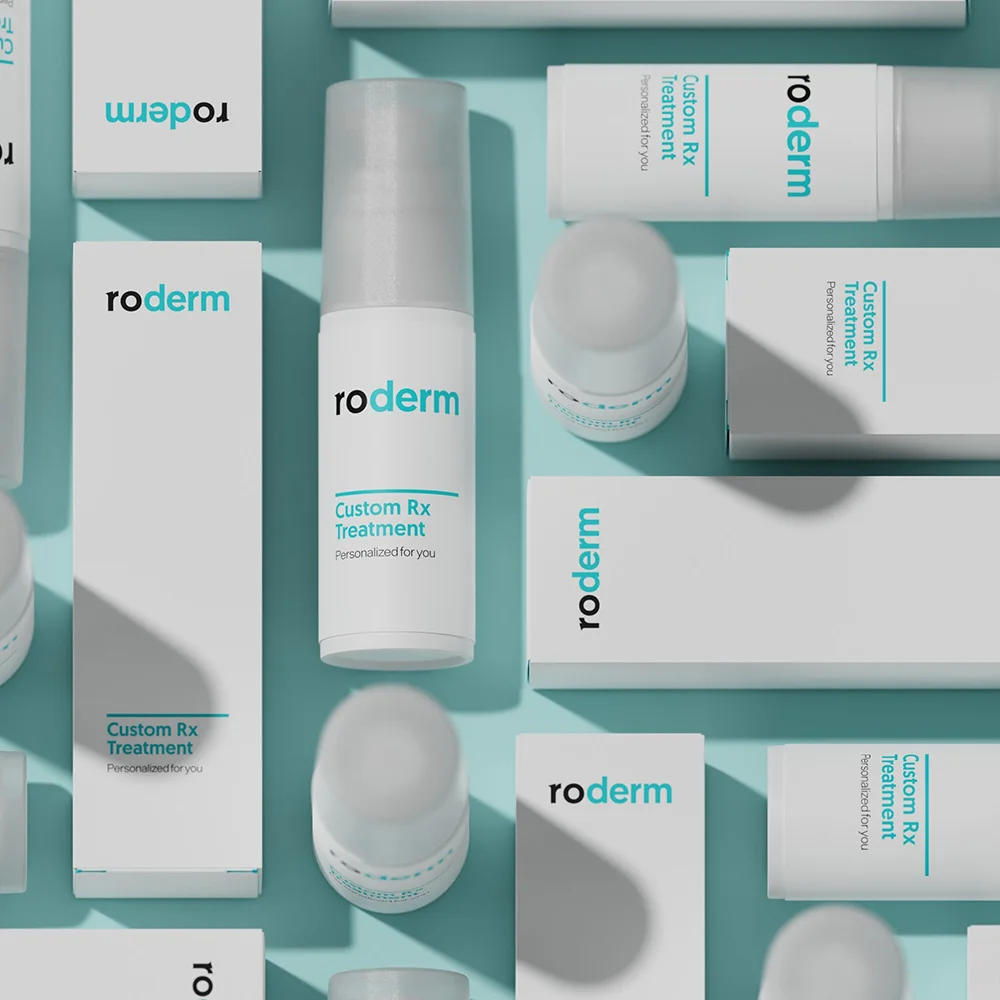Here's what we'll cover
Here's what we'll cover
The more time you spend browsing skincare products, the more overwhelmed you may feel by all the options. You may wonder if you should see a dermatologist, or if you can DIY your way to clearer, younger-looking skin with off-the-shelf products.
Skincare product labels can be confusing because many of the ingredients sound similar. A good example is retinol versus retinoids. Keep reading to learn more about these popular cosmetic treatments and how they differ.
What is a retinoid?
Retinoids represent a broad class of compounds derived from vitamin A. Retinoids are used to treat a variety of medical conditions including types of leukemia, acne, and psoriasis (Zasada, 2019; Yoham, 2021).
Retinoids are divided into four generations:
First generation. Retinoic acid (the original retinoid) is naturally made from the breakdown of vitamin A and helps cells develop and grow. First generation retinoids include isotretinoin (Accutane) and tretinoin (Retin-A), which are drugs prescribed for severe acne and to reduce signs of aging (Yoham, 2021).
Second generation. This generation of retinoids are synthetic and have a modified chemical structure. One example is acitretin (Soriatane), an oral medication that treats plaque and pustular psoriasis (Zito, 2022).
Third generation. Examples include tazarotene (Tazorac) and adapalene (Differin), both effective acne treatments. However, 0.1% adapalene may have fewer side effects than tretinoin (Zasada, 2019; Rusu, 2020).
Fourth generation. This is the newest topical retinoid available by prescription. Trifarotene (Aklief) is the only topical retinoid that selectively targets a specific retinoic acid receptor in the skin. Aklief cream is FDA-approved to treat face or body acne (including breakouts on the chest, shoulders, and back) in adults and children age nine and up (FDA, 2019).
Tretinoin Important Safety Information: Read more about serious warnings and safety info.
What is retinol?
They might sound similar, but retinol and retinoids aren’t the same things. Retinols are a type of retinoid that belong to the first generation class. Compared to other retinoids like tretinoin, retinols are generally less powerful and easier to tolerate.
Retinol is found in a vast array of anti-aging products sold over-the-counter (OTC). It’s used to improve uneven skin tone and texture. Retinol is not FDA-approved to treat acne, sun-damaged skin, or any other skin condition (AAD, 2021).
Is adapalene a retinol?
A lesser-known relative of retinol is adapalene. This medication is actually a retinoid, but it’s often confused as a retinol because it’s available OTC. Do not be fooled by its OTC status—adapalene is a powerful retinoid, though it may cause less irritation than others like tretinoin (Rusu, 2020).
Adapalene is a topical medication, which means you apply it directly to the skin. Originally, all products were prescription-only, but now you can get Differin Gel 0.1% OTC. You can also get the gel, cream, or lotion at a higher strength of 0.3%. Products of a higher concentration require a prescription.
The FDA has approved Differin to treat acne. The product also has anti-aging effects. In a clinical trial, 0.3% adapalene was found to be just as effective as tretinoin in reducing the appearance of forehead wrinkles, fine lines around the eyes, and dark spots (Bagatin, 2018).
Benefits of topical retinoids
Topical retinoids (including retinol) work by keeping pores from clogging, which can reduce acne and acne scars. Retinoids and retinol also boost the production of collagen (a structural protein in your skin and connective tissues), which may diminish the appearance of wrinkles (Kong, 2016).
The antioxidant effects of retinoids are what heal sun damage. These vitamin-A derivatives also speed up skin cell turnover and affect pigment production, which can even skin tone and lessen dark spots (Yoham, 2021; Rusu, 2020).
Retinol vs. retinoids: which should you use?
There isn’t a one-size-fits-all wrinkle or acne treatment. What skincare product is best for you depends on factors like your skin type, skin sensitivity, acne (or acne scarring), as well as your budget.
If you have mild acne and no other skin conditions, Differin Gel 0.1% is a good place to start. It’s OTC and costs around $15. Be sure to carefully follow the directions on the product’s label before using it.
If you want to improve skin texture and reduce wrinkles, an OTC retinol cream or serum is your best bet. Ingredients to look for in products are retinyl palmitate and retinaldehyde. Costs vary widely for OTC retinol products, so it just depends on what you want to spend.
For professional advice, consider seeing a board-certified dermatologist. They may prescribe a retinoid like Retin-A if they deem it safe. Generic tretinoin cream or gel typically costs under $30. A dermatologist can also recommend a skincare routine that works for your skin type and minimizes any side effects.
Risks and side effects
Common side effects of retinoids and retinol include (Tolaymat, 2022; Yoham, 2021):
Skin irritation or itchiness
Dryness and flaking
Burning or stinging, especially when skin is exposed to cold, windy weather
Redness or discoloration (depending on your natural skin tone)
Skin that’s more prone to sunburns
New or worsening acne
Topical retinoids commonly cause side effects, particularly in the first few weeks of treatment. Healthcare providers usually suggest starting out with the lowest strength possible, using it only every other day. Over time, you can work your way up to a stronger retinoid depending on your skin goals.
To minimize side effects, only apply a retinoid or retinol before bedtime. The next morning, wash your face, then apply a gentle moisturizer with sunscreen. Retinols and retinoids are not safe for everyone. People with sensitive skin may not be able to tolerate them.
Check with a healthcare provider or dermatologist before using these products if you’re pregnant, trying to become pregnant, or breastfeeding. Isotretinoin, for instance, is not safe to use during pregnancy because of the risk of miscarriage or severe birth defects (Yoham, 2021).
DISCLAIMER
If you have any medical questions or concerns, please talk to your healthcare provider. The articles on Health Guide are underpinned by peer-reviewed research and information drawn from medical societies and governmental agencies. However, they are not a substitute for professional medical advice, diagnosis, or treatment.
American Academy of Dermatology (AAD). (2021). Retinoid or retinol? Retrieved from https://www.aad.org/public/everyday-care/skin-care-secrets/anti-aging/retinoid-retinol
Bagatin, E., Gonçalves, H. S., Sato, M., et al. (2018). Comparable efficacy of adapalene 0.3% gel and tretinoin 0.05% cream as treatment for cutaneous photoaging. European Journal of Dermatology, 28 (3), 343–350. doi:10.1684/ejd.2018.3320. Retrieved from https://pubmed.ncbi.nlm.nih.gov/30105991/
Kong, R., Cui, Y., Fisher, G. J., et al. (2016). A comparative study of the effects of retinol and retinoic acid on histological, molecular, and clinical properties of human skin. Journal of Cosmetic Dermatology, 15 (1), 49-57. doi:10.1111/jocd.12193 Retrieved from https://pubmed.ncbi.nlm.nih.gov/26578346/
Rusu, A., Tanase, C., Pascu, G. A., & Todoran, N. (2020). Recent advances regarding the therapeutic potential of adapalene. Pharmaceuticals, 13 (9), 217. doi:10.3390/ph13090217. Retrieved from https://www.ncbi.nlm.nih.gov/pmc/articles/PMC7558148/
Tolaymat, L., Dearborn, H., & Zito, P. M. (2022). Adapalene. StatPearls . Retrieved on May 4, 2022 from https://www.ncbi.nlm.nih.gov/books/NBK482509/
U.S. Food and Drug Administration (FDA). (2019). Aklief (trifarotene) cream . Retrieved from https://www.accessdata.fda.gov/drugsatfda_docs/label/2019/211527s000lbl.pdf
Yoham, A. & Casadesus, D. (2021). Tretinoin. StatPearls . Retrieved on May 4, 2022 from https://www.ncbi.nlm.nih.gov/books/NBK557478/
Zasada, M. & Budzisz, E. (2019). Retinoids: active molecules influencing skin structure formation in cosmetic and dermatological treatments. Advances in Dermatology and Allergology, 36 (4), 392–397. doi:10.5114/ada.2019.87443 Retrieved from https://www.ncbi.nlm.nih.gov/pmc/articles/PMC6791161/
Zito, P. & Mazzoni, T. (2022). Acitretin. StatPearls . Retrieved on May 6, 2022 from https://www.ncbi.nlm.nih.gov/books/NBK519571/










